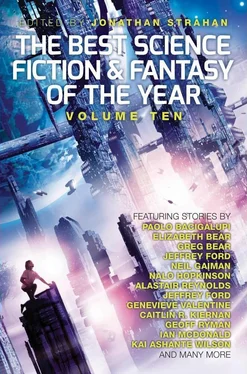And he looked at the eucalyptus tree.
It soared higher than the gate, its wild armature pawing at the night, the oily scent of its leaves potent even at this distance. Gramps shivered, although heat was swelling from the ground from the first patter of raindrops. More smells crept into the room: dust, trash, verdure.
He backed away from the window, slipped his sandals on, dashed out of the house. He ran toward the tea stall but, before he could as much as cross the chicken yard up front, lightning unzipped the dark and the sky roared.
THE BLAST OF its fall could be heard for miles.
The eucalyptus exploded into a thousand pieces, the burning limbs crackling and sputtering in the thunderstorm that followed. More lightning splintered the night sky. Children shrieked, dreaming of twisted corridors with shadows wending past one another. Adults moaned as timeless gulfs shrank and pulsed behind their eyelids. The walled city thrashed in sweatsoaked sheets until the mullah climbed the minaret and screamed his predawn call.
In the morning the smell of ash and eucalyptol hung around the crisped boughs. The princess sobbed as she gazed at her buckled tin roof and smashed stall. Shards of china, plywood, clay, and charred wicker twigs lay everywhere.
The laborers and steel workers rubbed their chins.
“Well, good riddance,” said Alamdin the electrician, father of the injured boy whose possession had ultimately proved fleeting. Alamdin fingered a hole in his string vest. “Although I’m sorry for your loss, bibi. Perhaps the government will give you a monthly pension, being that you’re royal descent and all.”
Princess Zeenat’s nose stud looked dull in the gray after-storm light. Her shirt was torn at the back, where a fragment of wood had bitten her as she scoured the wreckage.
“He was supposed to protect us,” she murmured to the tree’s remains: a black stump that poked from the earth like a singed umbilicus, and the roots lapping madly at her feet. “To give us shade and blessed sanctuary.” Her grimed finger went for the nose stud and wrenched it out. “Instead –” She backpedaled and slumped at the foot of her shack’s door. “Oh, my sisters. My sisters.”
Tutting uncomfortably, the men drifted away, abandoning the pauper princess and her Mughal siblings. The women huddled together, a bevy of chukars stunned by a blood moon. Their shop was gone, the tree was gone. Princess Zeenat hugged her sisters and with a fierce light in her eyes whispered to them.
Over the next few days Gramps stood at Bhati Gate, watching the girls salvage timber, china, and clay. They washed and scrubbed their copper pots. Heaved out the tin sheet from the debris and dragged it to the foundries. Looped the remaining wicker into small bundles and sold it to basket weavers inside the walled city.
Gramps and a few past patrons offered to help. The Mughal women declined politely.
“But I can help, I really can,” Gramps said, but the princess merely knitted her eyebrows, cocked her head, and stared at Gramps until he turned and fled.
The Municipality officer tapped at their door one Friday after Juma prayers.
“Condolences, bibi,” he said. “My countless apologies. We should’ve cut it down before this happened.”
“It’s all right.” The princess rolled the gold stud tied in a hemp necklace around her neck between two fingers. Her face was tired but tranquil. “It was going to happen one way or the other.”
The officer picked at his red birthmark. “I meant your shop.”
“We had good times here” – she nodded – “but my family’s long overdue for a migration. We’re going to go live with my cousin. He has an orange-and-fig farm in Mansehra. We’ll find plenty to do.”
The man ran his fingernail down the edge of her door. For the first time Gramps saw how his eyes never stayed on the princess. They drifted toward her face, then darted away as if the flush of her skin would sear them if they lingered. Warmth slipped around Gramps’s neck, up his scalp, and across his face until his own flesh burned.
“Of course,” the officer said. “Of course,” and he turned and trudged to the skeletal stump. Already crows had marked the area with their pecking, busily creating a roost of the fallen tree. Soon they would be protected from horned owls and other birds of prey, they thought. But Gramps and Princess Zeenat knew better.
There was no protection here.
The officer cast one long look at the Mughal family, stepped around the stump, and walked away.
Later, the princess called to Gramps. He was sitting on the mosque’s steps, shaking a brass bowl, pretending to be a beggar. He ran over, the coins jingling in his pocket.
“I know you saw something,” she said once they were seated on the hemp charpoy in her shack. “I could see it in your face when you offered your help.”
Gramps stared at her.
“That night,” she persisted, “when the lightning hit the tree.” She leaned forward, her fragrance of tea leaves and ash and cardamom filling his nostrils. “What did you see?”
“Nothing,” he said and began to get up.
She grabbed his wrist. “Sit,” she said. Her left hand shot out and pressed something into his palm. Gramps leapt off the charpoy. There was an electric sensation in his flesh; his hair crackled. He opened his fist and looked at the object.
It was her nose stud. The freshly polished gold shimmered in the dingy shack.
Gramps touched the stud with his other hand and withdrew it. “It’s so cold.”
The princess smiled, a bright thing that lit up the shack. Full of love, sorrow, and relief. But relief at what? Gramps sat back down, gripped the charpoy’s posts, and tugged its torn hemp strands nervously.
“My family will be gone by tonight,” the princess said.
And even though he’d been expecting this for days, it still came as a shock to Gramps. The imminence of her departure took his breath away. All he could do was wobble his head.
“Once we’ve left, the city might come to uproot that stump.” The princess glanced over her shoulder toward the back of the room where shadows lingered. “If they try, do you promise you’ll dig under it?” She rose and peered into the dimness, her eyes gleaming like jewels.
“Dig under the tree? Why?”
“Something lies there which, if you dig it up, you’ll keep to yourself.” Princess Zeenat swiveled on her heels. “Which you will hide in a safe place and never tell a soul about.”
“Why?”
“Because that’s what the fakir told my grandfather. Something old and secret rests under that tree and it’s not for human eyes.” She turned and walked to the door.
Gramps said, “Did you ever dig under it?”
She shook her head without looking back. “I didn’t need to. As long as the tree stood, there was no need for me to excavate secrets not meant for me.”
“And the gold stud? Why’re you giving it away?”
“It comes with the burden.”
“What burden? What is under that tree?”
The princess half turned. She stood in a nimbus of midday light, her long muscled arms hanging loosely, fingers playing with the place in the hemp necklace where once her family heirloom had been; and despite the worry lines and the callused hands and her uneven, grimy fingernails, she was beautiful.
Somewhere close, a brick truck unloaded its cargo and in its sudden thunder what the princess said was muffled and nearly inaudible. Gramps thought later it might have been, “The map to the memory of heaven.”
But that of course couldn’t be right.
“THE PRINCESS AND her family left Lahore that night,” said Gramps. “This was in the fifties and the country was too busy recovering from Partition and picking up its own pieces to worry about a Mughal princess disappearing from the pages of history. So no one cared. Except me.”
Читать дальше












